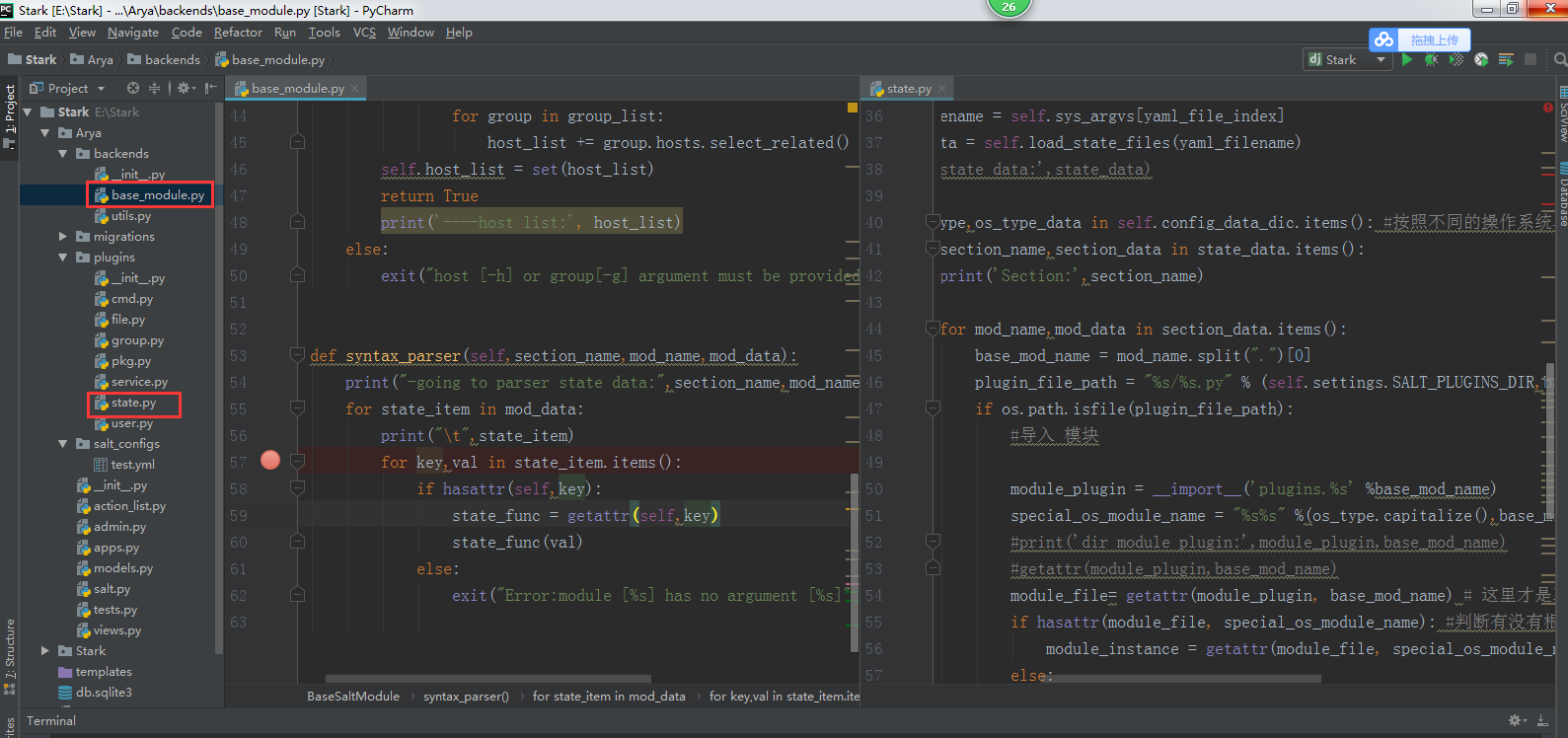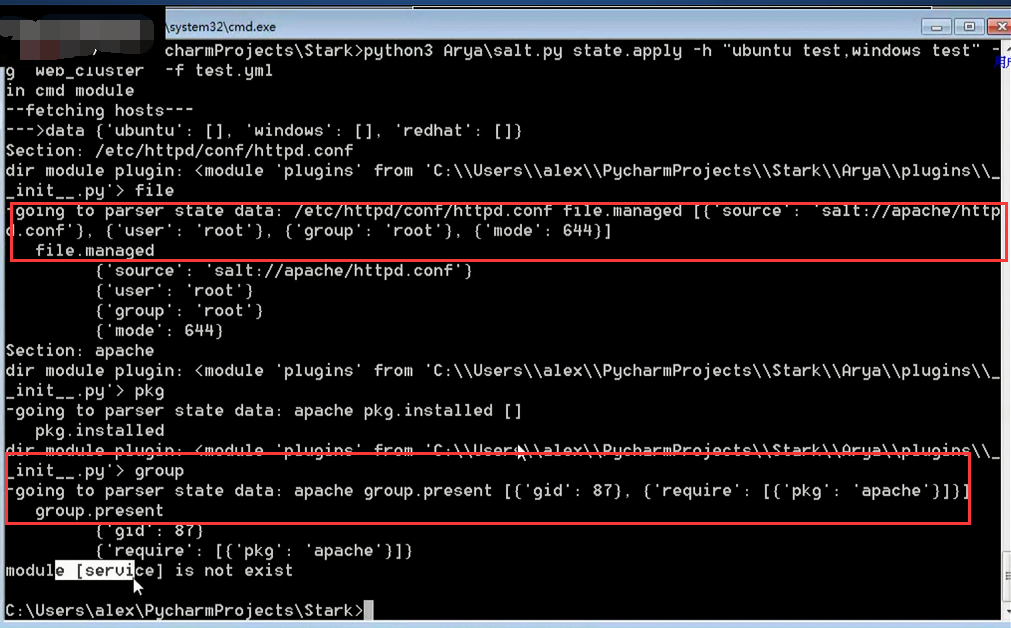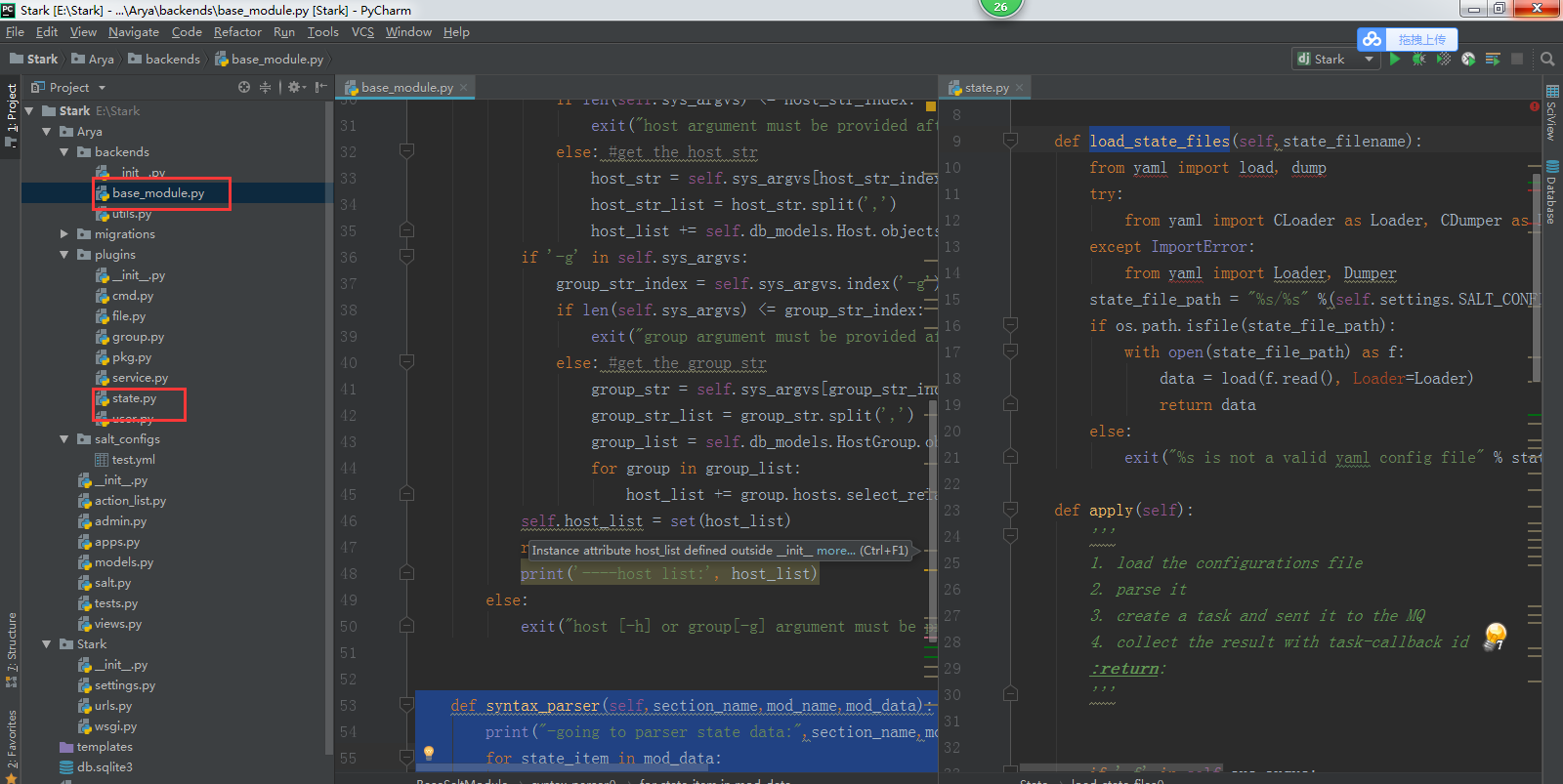saltstack主机管理项目:动态调用插件解析-模块解析(五)
一、动态调用插件解析
1、目录结构

1、base_module代码解析:
def syntax_parser(self,section_name,mod_name,mod_data):
print("-going to parser state data:",section_name,mod_name)
for state_item in mod_data:
print("\t",state_item)
for key,val in state_item.items():
if hasattr(self,key):
state_func = getattr(self,key)
state_func(val)
else:
exit("Error:module [%s] has no argument [%s]" %( mod_name,key ))
2、sate.py代码
#!/usr/bin/env python
# -*- coding:utf-8 -*-
# Author:luoahong
from Arya.backends.base_module import BaseSaltModule
import os
class State(BaseSaltModule):
def load_state_files(self,state_filename):
from yaml import load, dump
try:
from yaml import CLoader as Loader, CDumper as Dumper
except ImportError:
from yaml import Loader, Dumper
state_file_path = "%s/%s" %(self.settings.SALT_CONFIG_FILES_DIR,state_filename)
if os.path.isfile(state_file_path):
with open(state_file_path) as f:
data = load(f.read(), Loader=Loader)
return data
else:
exit("%s is not a valid yaml config file" % state_filename)
def apply(self):
'''
1. load the configurations file
2. parse it
3. create a task and sent it to the MQ
4. collect the result with task-callback id
:return:
'''
if '-f' in self.sys_argvs:
yaml_file_index = self.sys_argvs.index('-f') + 1
try:
yaml_filename = self.sys_argvs[yaml_file_index]
state_data = self.load_state_files(yaml_filename)
#print('state data:',state_data)
for os_type,os_type_data in self.config_data_dic.items(): #按照不同的操作系统单独生成一份配置文件
for section_name,section_data in state_data.items():
print('Section:',section_name)
3、运行截图

二、模块参数解析
1、目录结构
二、代码
#!/usr/bin/env python
# -*- coding:utf-8 -*-
# Author:luoahong
class BaseSaltModule(object):
def __init__(self,sys_argvs,db_models,settings):
self.db_models = db_models
self.settings = settings
self.sys_argvs = sys_argvs
def get_selected_os_types(self):
data = {}
for host in self.host_list:
data[host.os_type] = []
print('--->data',data)
return data
def process(self):
self.fetch_hosts()
self.config_data_dic = self.get_selected_os_types()
def require(self,*args,**kwargs):
pass
def fetch_hosts(self):
print('--fetching hosts---')
if '-h' in self.sys_argvs or '-g' in self.sys_argvs:
host_list = []
if '-h' in self.sys_argvs:
host_str_index = self.sys_argvs.index('-h') +1
if len(self.sys_argvs) <= host_str_index:
exit("host argument must be provided after -h")
else: #get the host str
host_str = self.sys_argvs[host_str_index]
host_str_list = host_str.split(',')
host_list += self.db_models.Host.objects.filter(hostname__in=host_str_list)
if '-g' in self.sys_argvs:
group_str_index = self.sys_argvs.index('-g') +1
if len(self.sys_argvs) <= group_str_index:
exit("group argument must be provided after -g")
else: #get the group str
group_str = self.sys_argvs[group_str_index]
group_str_list = group_str.split(',')
group_list = self.db_models.HostGroup.objects.filter(name__in=group_str_list)
for group in group_list:
host_list += group.hosts.select_related()
self.host_list = set(host_list)
return True
print('----host list:', host_list)
else:
exit("host [-h] or group[-g] argument must be provided")
def syntax_parser(self,section_name,mod_name,mod_data):
print("-going to parser state data:",section_name,mod_name)
for state_item in mod_data:
print("\t",state_item)
for key,val in state_item.items():
if hasattr(self,key):
state_func = getattr(self,key)
state_func(val)
else:
exit("Error:module [%s] has no argument [%s]" %( mod_name,key ))
sates.py
#!/usr/bin/env python
# -*- coding:utf-8 -*-
# Author:luoahong
from Arya.backends.base_module import BaseSaltModule
import os
class State(BaseSaltModule):
def load_state_files(self,state_filename):
from yaml import load, dump
try:
from yaml import CLoader as Loader, CDumper as Dumper
except ImportError:
from yaml import Loader, Dumper
state_file_path = "%s/%s" %(self.settings.SALT_CONFIG_FILES_DIR,state_filename)
if os.path.isfile(state_file_path):
with open(state_file_path) as f:
data = load(f.read(), Loader=Loader)
return data
else:
exit("%s is not a valid yaml config file" % state_filename)
def apply(self):
'''
1. load the configurations file
2. parse it
3. create a task and sent it to the MQ
4. collect the result with task-callback id
:return:
'''
if '-f' in self.sys_argvs:
yaml_file_index = self.sys_argvs.index('-f') + 1
try:
yaml_filename = self.sys_argvs[yaml_file_index]
state_data = self.load_state_files(yaml_filename)
#print('state data:',state_data)
for os_type,os_type_data in self.config_data_dic.items(): #按照不同的操作系统单独生成一份配置文件
for section_name,section_data in state_data.items():
print('Section:',section_name)
for mod_name,mod_data in section_data.items():
base_mod_name = mod_name.split(".")[0]
plugin_file_path = "%s/%s.py" % (self.settings.SALT_PLUGINS_DIR,base_mod_name)
if os.path.isfile(plugin_file_path):
#导入 模块
module_plugin = __import__('plugins.%s' %base_mod_name)
special_os_module_name = "%s%s" %(os_type.capitalize(),base_mod_name.capitalize())
#print('dir module plugin:',module_plugin,base_mod_name)
#getattr(module_plugin,base_mod_name)
module_file= getattr(module_plugin, base_mod_name) # 这里才是真正导入模块
if hasattr(module_file, special_os_module_name): #判断有没有根据操作系统的类型进行特殊解析 的类,在这个文件里
module_instance = getattr(module_file, special_os_module_name)
else:
module_instance = getattr(module_file, base_mod_name.capitalize())
#开始调用 此module 进行配置解析
module_obj = module_instance(self.sys_argvs,self.db_models,self.settings)
module_obj.syntax_parser(section_name,mod_name,mod_data )
else:
exit("module [%s] is not exist" % base_mod_name)
#print(" ",mod_name)
#for state_item in mod_data:
# print("\t",state_item)
except IndexError as e:
exit("state file must be provided after -f")
else:
exit("statefile must be specified.")
作者:罗阿红
出处:http://www.cnblogs.com/luoahong/
本文版权归作者和博客园共有,欢迎转载,但未经作者同意必须保留此段声明,且在文章页面明显位置给出原文连接。



